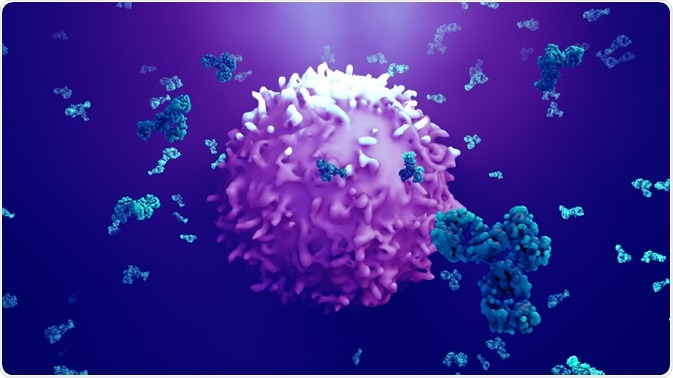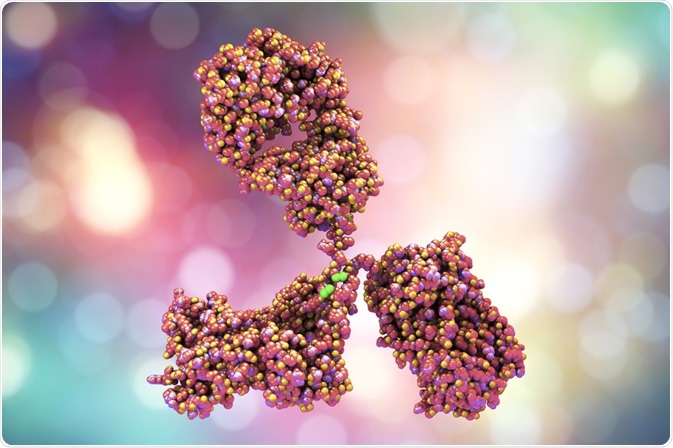Antibody-Drug Conjugates (ADC) is a type of anticancer drug that links a drug to cancer-targeting antibodies. The antibody detects tumor-specific proteins expressed on cancer cells and directs the cytotoxic anticancer drug towards the cancer cell.

Image Credit: Design_Cells/Shutterstock.com
Compared to alternative cancer treatments, for example, chemotherapy, immunotherapy, radiation, and stem cell therapy, ADC combines chemotherapy and immunotherapy and allows selective delivery of anticancer drugs and reduces systemic exposure and toxicity of anticancer drugs.
Components of ADC
One of the key requirements of ADC is the ability of monoclonal antibodies (mAb) to recognize tumor markers. These are unique antigenic markers highly expressed on cancer cells but are not found or in a low level of expression on normal, healthy cells.
For example, the HER2 (human epidermal growth receptor 2) receptor is expressed in cancer cells 100-fold higher than normal cells. Moreover, the markers should possess internalization properties that allow the ADC to be transported into the cancer cell upon binding. This enhances the ability of the drug to perform cancer-killing activities.
The mAb component of ADC is important and should fulfill several requirements: it should have high specificity and binding affinity to the target tumor marker. This ensures the mAb only targets cancer cells. The mAb should also have low immunogenicity and no cross-reactivity. In the first and second generation of ADCs, the mAb is a chimera of human and mouse antibodies.
Despite its high efficacy, it sometimes generated an immune response in the human body against the mouse component of the antibody. Because of this, third-generation ADC employs fully human antibodies, and these are used to treat cancers such as HER-2–positive metastatic breast cancer.
The cytotoxic payloads are another important component of ADC: it is the cancer cell-killing drug that is linked to the mAb. The cytotoxic payload is stable and non-toxic when linked to the ADC and is activated once cleaved from the ADC inside the cytoplasm of cancer cells. There are 2 main drug classes used in ADC: microtubule-disrupting agents and DNA-damaging agents.
The mAb and cytotoxic payload are linked by linkers. The linker must be stabilized during ADC circulation in the blood to prevent the release of the drug in non-target tissues; at the same time, the linker should release the drug upon internalization into cancer cells. There are cleavable and non-cleavable linkers.
Non-cleavable linkers are molecules that consist of strong bonds that resist proteolytic degradation. The drug of ADC with non-cleavable linkers is released when the mAb component is degraded by the lysosome. Cleavable linkers are more common in ADC. They are cleaved by the chemical and physiological differences between the extracellular and intracellular environment (redox potential, pH).

Image Credit: Kateryna Kon/Shutterstock.com
Mechanism of action
ADC is administrated intravenously into the bloodstream to avoid linker cleavage by acid and enzymes in the digestive system. Upon recognition of the mAb component to tumor-specific markers, ADC is internalized into cancer cells via receptor-mediated endocytosis.
Environmental changes such as low pH in the endosome and the presence of lysosomes inside the cell trigger the release of the cytotoxic payload of ADC. When released, the cytotoxic payload interferes with cellular mechanisms and induce programmed cell death – apoptosis.
Resistance to ADC
Although ADC provides a highly specific, low immunogenic cancer therapy, cancer cells that are pressured to survive ADC treatment lead to resistance to ADC. Resistance can be acquired, or cancer cells can be intrinsically resistant to different components of the ADC.
Tumour marker-related resistance can be due to decreased expression levels of the markers or masking of the marker with the extracellular matrix. Also, the upregulation of drug efflux pumps can expel cytotoxic payload from the cytoplasm of cancer cells. This limits the clinical success of ADC.
Future perspectives
Although there are only four approved ADC available in the clinical setting, the design of ADC is continuously improving for higher specificity, lower immunogenicity as well as tackling resistance. There are currently around 60 ADC under clinical development and some are showing promising outcomes.
All in all, ADC is a promising therapeutic approach to treating cancers and is being constantly improved and developed.
References:
- Nejadmoghaddam, M. R., Minai-Tehrani, A., Ghahremanzadeh, R., Mahmoudi, M., Dinarvand, R., & Zarnani, A. H. (2019). Antibody-Drug Conjugates: Possibilities and Challenges. Avicenna Journal of medical biotechnology, 11(1), 3–23.
- Zhao, Pengxuan, Zhang, Yuebao, Li, Wenqing, Jeanty, Christopher, Xiang, Guangya, & Dong, Yizhou. (2020). Recent advances of antibody-drug conjugates for clinical applications. Acta Pharmaceutica Sinica. B, Acta Pharmaceutica Sinica. B, 2020-04.
- Khongorzul, Puregmaa, Ling, Cai Jia, Khan, Farhan Ullah, Ihsan, Awais Ullah, & Zhang, Juan. (2020). Antibody-Drug Conjugates: A Comprehensive Review. Molecular Cancer Research, 18(1), 3-19.
Further Reading